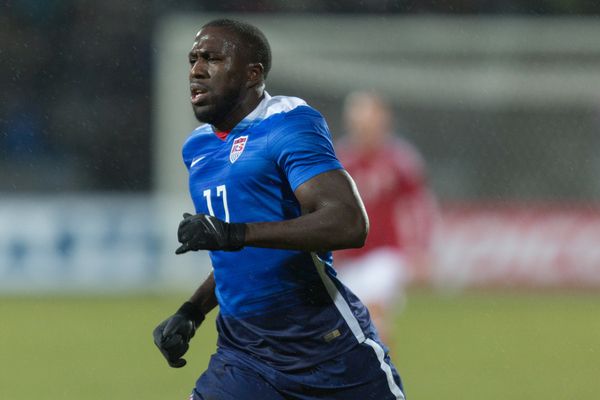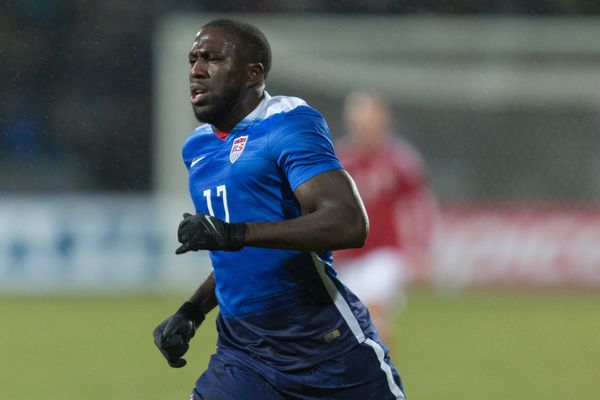It will be a special scenario for Jozy Altidore when he steps on the field against Haiti for the first time in the USA’s second Gold Cup match at Friday evening at Gillette Stadium. Altidore grew up in Boca Raton, Fla. as the son of Haitian immigrants. Over the years he has become an attacking pillar for the MNT, scoring 27 goals in 82 appearances, and all the while, he’s carried along the Haitian roots passed to him by his parents.
In 2010, as then 20-year-old Altidore and the rest of the United States had their sights on the 2010 FIFA World Cup in South Africa, disaster shook the Caribbean nation. A 7.0 magnitude earthquake crumbled the country, claiming the lives of more than 200,000 people and leaving one million more homeless.
Altidore saw the news bulletins broadcasting the disaster on TV. He saw the country he had visited a number of times growing up diminished to rubble. Altidore leapt to action, and through personal donations and fundraising, quickly contributed over $100,000 towards scholarships and water stations in Haiti.
From the beginning, Haiti has held a special place in Altidore’s heart. For him it was a relationship that started at home. While he was born in New Jersey and grew up in Florida, in his American household everything was influenced by the homeland.
“I think the fact that [my parents] were out of Haiti didn’t mean that Haiti was out of them,” Altidore said. “We were still brought up as a Haitian household in terms of the food we ate, how we were disciplined … just about everything about us was still Haitian even though we were living in the U.S. The only thing that was on TV was soccer. We had Haitian TV, Haitian radio and Haitian music. I was very strongly linked to my Haitian roots and my parents were proud of where they came from, and it made us proud of where they came from. It was celebrated every day.”
Altidore’s parents took him to Haiti for the first time when he was 10-years-old. It was a family vacation and an opportunity for him and his brother to see where their parents had grown up.
“I just remember it being a country that had very little obviously, and you saw a lot of people without homes or living on the street, and it was tough,” Altidore said. “My first thought was, ‘Wow, my parents came from here. Look at what they had to come through to get where they are today.’ I was just in awe of them and it made me become even more in awe of them to see what they went through to get to where they are today.”
Haiti became a regular destination for the Altidore family over the years. Jozy built a bond with the people in the community there, and a lot of his experiences came through his favorite sport, where he learned what life was like for them.
“The times I went, me and my brother jumped into maybe a pickup soccer game a day,” Altidore said. “The kids are playing every day on the street. From seven in the morning to midnight the kids are playing. It was incredible. They just kept going. We’re talking about families where their parents made less than a dollar a day and they’re still out playing soccer barefoot on rocks and a whole bunch of other stuff. Me and my brother played with them and we had a great time. All they wanted to do was play soccer and just have fun and that was pretty crazy for us to see. They had nothing. All they were trying to do was find a decent little patch of rock to play soccer on, because they didn’t have any grass areas over there.”
With the perspective gained from his experiences in Haiti growing up, it was easy for Altidore to see that it was a nation that needed help. More and more, he has lent his hand to the country.
“I think Haiti is a nation that has been under duress for the last decade, or even longer beyond that. It’s just always having unfortunate things happen. I think it’s the responsibility of countries like the U.S. and the superpowers of the world to look on nations like that and try and give them a hand, because let’s face it, at this very moment they may not be able to do it themselves, as much as they would like. To give them a hand every now and again would be important and go a long way with the development of the country and give more opportunity to the kids that are still there and trying to make a life for themselves.”
Altidore has contributed a lot to Haiti and invited others to do so as well. He’s given numerous personal donations and has worked with organizations focused on aiding the nation.
“To be honest I think everything I’ve done has been great and I’ve enjoyed doing it, but what sticks out to me was the building of a fresh water well, which was cool because I got to see pictures of the kids and the families that it was going to help,” Altidore said.
His efforts in Haiti aren’t going unnoticed by the people he’s helping.
“I went one day on a Haitian radio show that my dad always had on in the house and I got calls from a bunch of Haitian listeners. It was just so crazy to hear how they’ve been inspired by what I’ve been able to do with my career and what I continue to try and do for Haiti. I never thought I had that type of reach to the people in Haiti, and I’m finding out now that they’re paying attention to what I’m doing and what I’m trying to do to help them. They are very proud of me as a soccer player, and that definitely fuels me and excites me to know that I have not only the U.S. fans and the U.S. people supporting me, but also people in Haiti that are looking to see what I’m doing, which is great.”
Just after the Caribbean nation was struck by the devastating earthquake in 2010, Altidore, who was playing for Hull City at the time, score a game-winning goal against Manchester City and celebrated by raising a wristband bearing the Haitian flag as a tribute. After 81 matches for the U.S., he will finally step on the field against Haiti on Friday.
“It’s going to be weird,” Altidore said about the prospect of competing against Haiti. “It’s definitely going to be different. I started off playing with a Haitian-American wristband on my wrist. Both of my cleats have the Haitian flag on them. I used to play with a t-shirt underneath my jersey with a Haitian flag, so it’s going to be a bit surreal to play that game. I think it’s going to be an emotional day for me and my family. My parents will be at the game. It will be strange in a lot of ways, but I’m also excited.”






